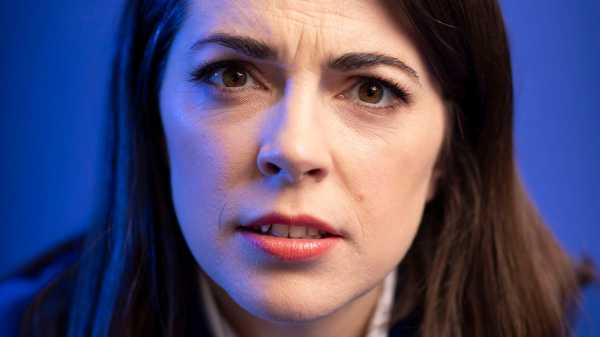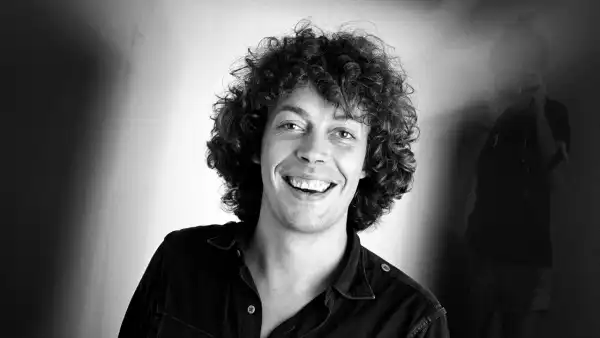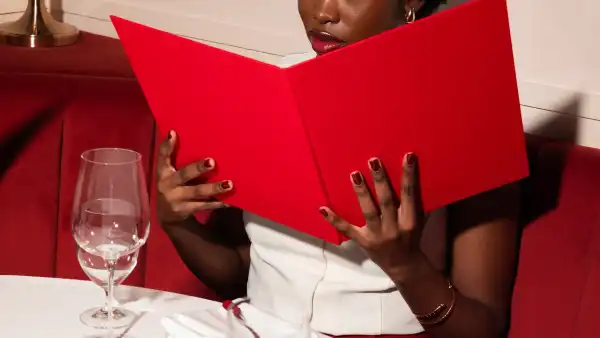
Save this storySave this storySave this storySave this story
When the British comedian Rosie Holt heard that Rishi Sunak, then the Prime Minister and head of the Conservative Party, would be holding a snap election in July, earlier than many expected, her first thought was: “So annoying!” “The election screwed up so many things,” she told me on a recent hot afternoon. Holt was drinking a gin-and-tonic at the Prince, a sweltering wood-panelled pub in Stoke Newington, in North East London. I opted for a beer. A ceiling fan circled overhead, doing nothing to dispel the heat. “There’s definitely a feeling now, with Labour, that we have grownups back in charge of the country, whereas for the last few years it’s felt like the U.K. is run by lunatics,” Holt said. “I reckon they won’t be such easy targets.”
Since 2021, through the “lunatic” last years of Tory rule, Holt has provided biting commentary on the mishaps of the Conservative Party through her satirical alter ego Rosie Holt M.P., a very convincing fake Member of Parliament. Overconfident and underqualified, Rosie Holt M.P. is the sort of backbencher who appears regularly on television to defend more senior ministers. She wears a blunt bob and nude heels, and will cheerfully bluster her way through an interview. In the U.K., Holt’s character has become a sensation, with clips on X routinely going viral. In the lead-up to the general election, which saw the Conservatives voted out of power after fourteen years, Holt toured a popular show called “That’s Politainment!” Her recent book, “Why We Were Right,” by Rosie Holt M.P., “Loyal Servant to Boris, Liz and Rishi,” was written, as the book flap says, “to celebrate the last 14 years of Conservative government and explain to you, the British public, why the so called ‘scandals’ or ‘controversial’ decisions derided by the Woke, Remoaning Left and the media elites were completely right (and intentional) all along.”
Holt’s satire is a window into the end of the Tory years. She conceived of her M.P. when the most pressing question in British politics revolved around wine and cheese. Specifically, who consumed the canapés, and where? In December, 2021, a photograph of then Prime Minister Boris Johnson in the garden of 10 Downing Street went viral. The image was taken in May, 2020, at the height of the U.K.’s first COVID-era lockdown, when “nonessential” gatherings were expressly banned. In the picture, however, Johnson is seated at a table with two men and his then fiancée, Carrie Symonds, who is holding the couple’s new baby. There’s booze out—bottles and long-stemmed glasses—and nibbles. In the background, there are two more groups of people, and more bottles. They look relaxed, gesticulating in shirtsleeves. Busted!
When the garden-party photo hit the British papers, the Deputy Prime Minister, Dominic Raab, gave a painful interview to Sky News defending Johnson. Was this work or a party? “This is a place of work, but it’s also the residence of the Prime Minister,” Raab told the host, Kay Burley. “And sometimes, as in many work situations, particularly given the pressures that the No. 10 team are under, they might have a drink after the formal business has ended.” They quibbled over whether it was normal to bring a baby to a business meeting, and if the attendees were wearing suits. “Some of them have taken their jackets off,” Raab conceded.
Holt was watching the exchange from her parent’s sofa in Bath, where she was recovering from having her wisdom teeth removed. She thought it was hilarious. “He looked absolutely terrified,” she told me at the pub. “I thought, That would be really funny to emulate. How do I do that?” In her parent’s back yard, she filmed herself responding to Burley’s questions as if she were a clumsy Member of Parliament. She wore a scarf, blinked repeatedly, and remained earnestly polite. “I don’t know about you, Kay, but I can’t work without wine and cheese,” she says, grimacing. “Just because people aren’t following social-distancing rules doesn’t mean they’re not following social-distancing rules.” She spliced the clip into footage of Raab’s interview and uploaded it to X, where it got more than a million views.
Soon afterward, a former civil servant named Sue Gray was put in charge of an investigation into parties held by government officials during the pandemic. When Johnson gave an interview refusing to say whether he had attended any of the parties until Gray’s investigation was complete, Holt’s character again came to his defense. “It’s the age-old question,” she said, in a clip. “If a tree falls in a forest but no one’s there to hear it, does it make a sound? Well, if there was a party in lockdown, when we told everyone they couldn’t even attend funerals, but no one knew about it, was there a party?” The spoof got six million views over a few days. Her delivery was so believable that Henry Bolton, the former head of the right-wing U.K. Independence Party, spoke out against it. The British press reported that the philosopher Anthony Grayling called her a “bald-faced emetic,” and that the author Philip Pullman said he was “aghast.”
Unlike Rosie Holt M.P., Rosie Holt the comedian often wears overalls and tank tops, and keeps her hair in a messy bun. A news junkie who spends a lot of time watching the morning broadcast rounds, she is talkative and casual in person. (She helped herself to my fries the first time we met.) “It was really surreal,” she said, of people thinking her videos were real. She had had success with other characters—a bombastic right-wing journalist, for instance—but nothing on the scale of her M.P. Holt told me she trained as an actor at the London Academy of Music and Dramatic Art, but struggled to find gigs after graduation. To make ends meet, she worked odd jobs as a waitress, a gym receptionist, and a temp at various hedge funds. She starred in a touring version of “Wuthering Heights” (“I gate-crashed the audition”) and a “deeply eccentric” version of “Romeo and Juliet,” as well as a theatrical parody of Netflix’s “The Crown.” Then the pandemic hit, and she found herself at home, watching the last years of the Tories unfold on TV. It turned out to be a boon. “It felt like there was something in the news all the time, and a series of ministers saying some really ridiculous things,” she said. “A clown show.”
Rosie Holt M.P. represents the fictional constituency of Ackenfield West, which Holt imagines as an “easy, safe seat, where she doesn’t have to work terribly hard to win.” Leafy. Suburban. After the early sketches, Holt gave her an identifiable look: a bright-blue pants suit inspired by Liz Truss, with whom she was“obsessed” at the time. Beyond being famous for having had the shortest premiership in British history—forty-nine days—Truss, Holt said, seemed to love the camera, “which is why when you Google her there are so many pictures of her in fabulous outfits.” (One famous photo shows her biking in the rain under a Union Jack umbrella.) After Truss wore the blue suit, Holt noticed Truss’s Home Secretary wearing one all the time, too. The suit was a symbol, Holt said, like when politicians have “loads of flags in their background when they’re talking on Zoom in their kitchen. “It was a way of going, I am Tory, and I am proud, and I need you to know all the time.”
The newly elected Labour government, led by the dryly practical Keir Starmer, has forced Holt to rejigger her jokes. When it seemed clear that Labour would win, Holt made some additions to “That’s Politainment!” At various times throughout the show, the lights dim and she asks the audience to keep very quiet because a Labour policy has just entered the room, and she doesn’t want to scare it off. “This is very exciting—they’re very rare,” she says. Then, to an audience member: “Don’t move, but I think you’ve got one on your shoulder.” (A key criticism of Starmer’s campaign was that it wasn’t clear how his policies differed from the Conservatives’.) After an hour of passionately defending the Tories, Rosie Holt M.P. dramatically crosses the floor to Labour, hanging up her blue blazer to reveal a red top. “Red is the new blue!” she shouts.
“Part of my way of skewering the last government was through their defense of nonsensical and illogical policies, which they themselves looked like they didn’t believe,” Holt told me. With Labour, she’s still figuring out what weaknesses they have that can be “comically exploited.” “I think any government needs to be held to account, even the more competent well-meaning ones,” she said. Lately, she’s zeroed in on what she sees as “Labour’s main line of attack, which is that the Tories have destroyed Britain so much that Labour can’t be responsible for any tough decisions they make from this point forward.” In one extended bit, which I saw her workshop at a comedy club in South London, Rachel Reeves, the new Chancellor of the Exchequer, goes into her office and finds nothing but an empty cupboard labelled “Britain’s Finances.” She climbs into the cupboard, discovers it leads to Narnia, and finds that the Conservatives have given all of Britain’s finances to the White Witch.
Given her flexible loyalty, what does Rosie Holt M.P. actually believe? “I don’t think she necessarily believes in anything,” Holt said. “She’s very eager to please. She likes being in front of the camera, and she likes the opportunity to prove herself to the government.” When Holt goes into character, her whole face changes: her eyes widen, her mouth pinches. “It’s a smug look,” she said. “All of her beliefs that she talks about are either a mix of things that she’s parroted, or things that she thinks are the party line, that she doesn’t quite understand. She’s a bit like an empty vessel.” In “That’s Politainment!,” she’s painfully needy, trying to ingratiate herself by repeating names over and over again to the point of absurdity. “What’s your name?” she asks someone in the front row at one point in the show. “Des? Des! Des! Desmond! Des! Des!” She borrowed that bit from her impression of the former Labour leader Ed Miliband. “He would pick someone in the audience, and he would go”—Holt lowered her voice—“ ‘So, James.’ ‘And, the thing is, people like James.’ It was obviously something he’d been told he should do.”
The awkward former Labour leader Gordon Brown, who was elected Prime Minister in 2007, was another inspiration. “Someone had clearly said to him, ‘You need to smile more.’ ” Holt said. “As a result, he’d smile at really inopportune and odd moments. It was so unnatural.” Boris Johnson was “awful and devastating for this country,” she went on, but he did possess “a sort of superficial charm.” “But there are a lot of M.P.s who don’t—who have clearly employed someone who has said, ‘This is how you do it.’ And they’ve given them skills, but those skills are no good if you don’t have a basic understanding of human beings.” She mentioned the former Health Secretary Matt Hancock, who served under Johnson during the pandemic. Hancock was later suspended as a conservative M.P. for appearing on the survival reality-TV show “I’m a Celebrity . . . Get Me Out of Here!” (He finished in third place; Holt watched the whole series.) “It seemed such a weird way to prove you’re a normal person,” she said. “By accepting thousands and thousands of pounds to go to the jungle, and eat camel penises, and sit around a campfire with Boy George.”
She had almost finished her drink. The pub remained sweltering. Holt’s comic heroes are artists that have sustained a satirical character through the years. Steve Coogan débuted his inept broadcaster, Alan Partridge, in 1991, and the character is still going strong. “He keeps coming back.” She mentioned the British comedian Rik Mayall, whose egotistical fictional M.P., in the sitcom “The New Statesman,” released in the late eighties, was named Alan B’Stard. She admires Armando Iannucci’s “The Thick of It,” which focussed on a Labour government perpetually in crisis. The best muses, however, are still the politicians themselves. “Whenever you get a minister on TV, they’ve often been given very little prep on what they’re going to be talking about,” she said. “Something in the news will happen and they’ll have to go out and defend something. As a result, they often have a ‘deer in headlights’ expression. There’s a kind of tension there of, What am I going to be asked?” she said. “I’ve always been fascinated by that shared look.” ♦
Sourse: newyorker.com






